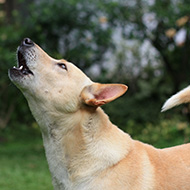
The study is the first to investigate the behaviour in domestic dogs.
Dog breeds that are genetically similar to wolves, such as huskies, Alaskan malamutes and shar-peis, are more prone to howling and show more stress-related behaviours, according to new research.
Ethologists at Eötvös Loránd University also found that dog breeds more distantly related to wolves, known as modern breeds, are typically more likely to bark rather than howl.
The findings, published in Communications Biology, suggest that while most dog breeds can howl, its original purpose may fade away in modern dog breeds with ageing.
First author Fanni Lehoczki explains: “It seems that although howling is present in most breeds’ repertoire, it lost its functionality due to the changed social environment, thus, modern breeds do not use it in adequate situations”.
In the study, researchers explored the reactions of 68 domestic, pure-bred dogs to recordings of wolf howls. Of these, 17 dogs belonged to ancient breeds - or those genetically similar to wolves - including the Shiba inu, Siberian husky, Alaskan malamute, Akita inu, Shih tzu, and Pekingese.
The team found that not only did the ancient breeds often respond to the howls with howling, but they also got more stressed. On the contrary, the modern dog breeds responded to the howling with barks.
Interestingly, the genetic effect of howling only appeared among dogs older than 5.2 years. Younger dogs of ancient and modern breeds howled in much the same way.
The team also noted that ancient breeds tended to show more stress-related behaviours when reacting to the wolf howls. According to the researchers, this could be because the dogs comprehend more of the wolf howls, and respond to them with greater stress because they see themselves as intruders - and therefore produce howls to avoid them.
Senior author Tamás Faragó said: “We assume that more ancient breeds, which are genetically closer to wolves, can process the information encoded in wolf howls better than modern breeds. Thus, ancient breeds of our study might become stressed by intruding on a pack’s territory and use howling for the sake of avoidance, just as wolves do.”
The study is the first of its kind to show how the domestication of dogs significantly altered their vocal repertoires and how they respond to this ancient form of communication.



 The latest
The latest